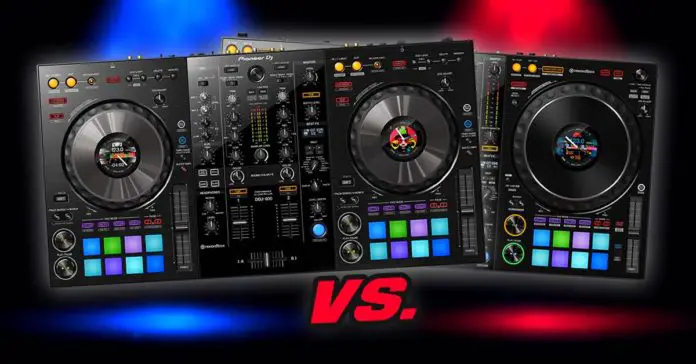Pioneer DDJ-1000 vs. Pioneer DDJ-800. What are the main differences between these DJ controllers? How do they compare to each other in terms of build quality and features? Which one of these should you choose? There is a lot to be said here. We’ll answer all these questions and more. Let’s begin!
- The general comparison – main differences
- Mixer sections – 2 channels vs. 4 channels and more
- Jog wheels comparison
- Audio FX sections
- Performance pads
- Software compatibility
- Pioneer DDJ-400 vs. DDJ-800
- Pros and cons
- The price and availability
- The conclusion – which one is better for you?
This web portal is reader-supported, and is a part of the Amazon Services LLC Associates Program and the eBay Partner Network. When you buy using links on our site, we may earn an affiliate commission!
The general comparison – main differences
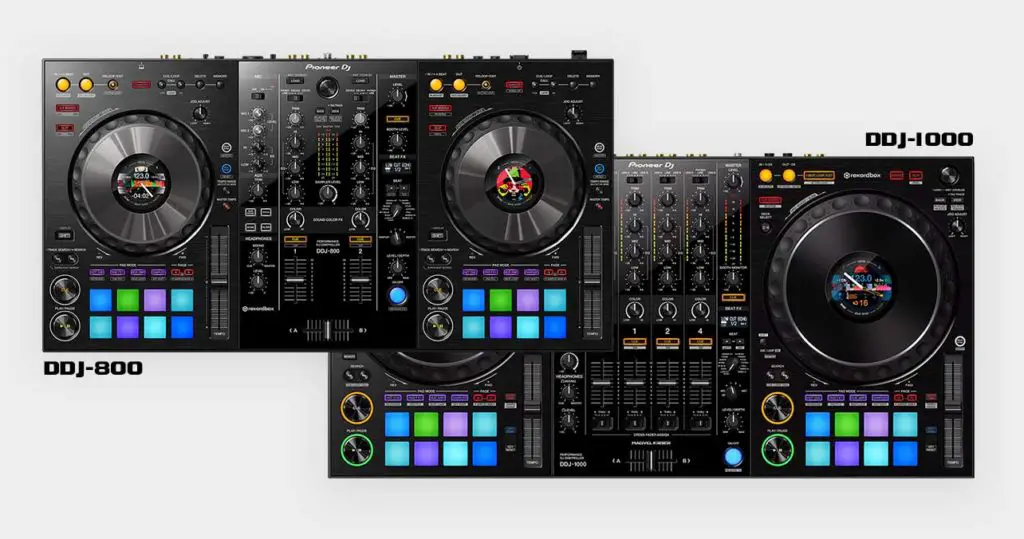
The Pioneer DDJ-800 can easily be seen as a smaller, more compact version of the full-fledged DJing powerhouse that is the well known and loved DDJ-1000. It can be also said, that in a sense the DDJ-800 is a step-up from entry-level DJ controllers like the Pioneer DDJ-400 or the DDJ-FLX6 – this is also true.
Pioneer DDJ-1000 – Is It Still Worth It? (Let’s Find Out!)
Although its smaller in size when compared to its bigger counterpart, its feature set is in fact really close to the Pioneer DDJ-1000. Keep in mind however, that there are quite a lot small yet important differences here, that might be the decisive factor in your final controller choice. Let’s go over all of these to help you choose between these two high-end DJ controllers.
Mixer sections – 2 channels vs. 4 channels and more
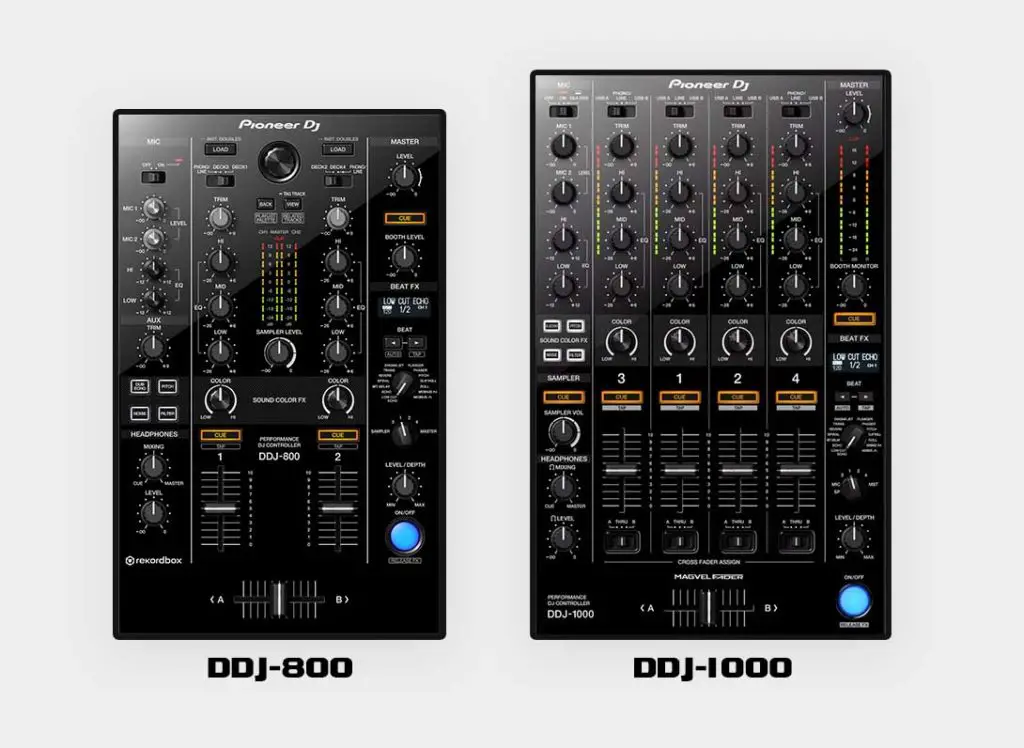
The main and most obvious difference here, is that while the Pioneer DDJ-800 features just 2 mixer channels, the DDJ-1000 gives you access to full set of 4 physical audio channels on the mixer.
For most DJs, having two channels will be enough, although its important to say that 4 mixer channels can give you access to additional audio inputs and more creative mix and mashup techniques.
The Pioneer DDJ-800 compensates for the lack of 4 mixer channels by giving you access to deck switch buttons than enable you to access virtual decks 3 and 4 using its 2-channel mixer.
Both on the Pioneer DDJ-800 and Pioneer DDJ-1000, the audio mixers can function in standalone mode. The Pioneer DDJ-800 however, doesn’t offer you hardware based audio FX – this means that the FX on the DDJ-800 won’t work when you’re using its mixer in standalone mode.
5 Best DJ Controllers With Motorized Platters (Full List)
When it comes to the crossfader, the DDJ-800 doesn’t have the Magvel crossfader that is present on the DDJ-1000. This means that the crossfader on the DDJ-1000 is of higher quality than the one present on the DDJ-800. This however is simply a matter of preference and it mostly concerns scratch DJs.
Another important fact is that the DDJ-1000 features double USB inputs perfect for back-to-back mixes and seamless DJ switching. Pioneer DDJ-800 features just a single USB input.
Jog wheels comparison
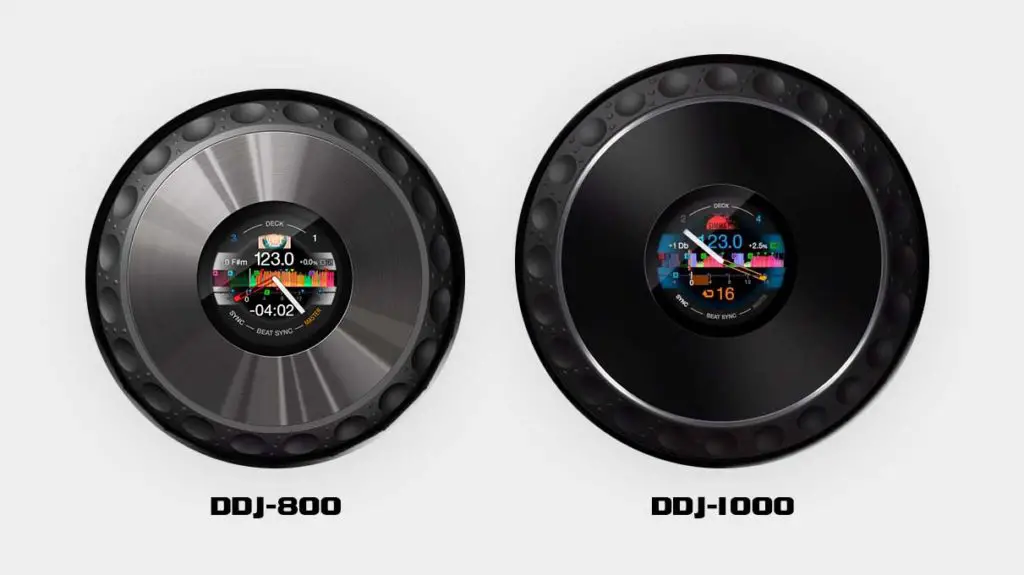
The jog wheels on these two devices at first look seem to be similar. There are however two key differences here.
First one is jog wheel size. The Pioneer DDJ-1000 has full-size ~8 inch mechanical jog wheels in store, while the DDJ-800 features smaller, 6 inch capacitive platters.
Jog wheels on the Pioneer DDJ-1000 are technically the jog wheels taken straight from the Pioneer CDJ-2000 line of DJ CD players. They work and feel almost exactly the same.
Pioneer DDJ-800 features much simpler capacitive jog wheels, that are different when it comes to handling from the mechanical solution on the Pioneer DDJ-1000. These jog wheels will be more similar to the ones you can find on DJ controllers such as the Pioneer DDJ-SX3.
Choosing mechanical jog wheels over capacitive ones or the other way around is purely a matter of personal preference.
Both of these DJ controllers feature a nifty jog wheel adjust knob that lets you set the desired “tightness” of the jog wheel mechanism.
Audio FX sections
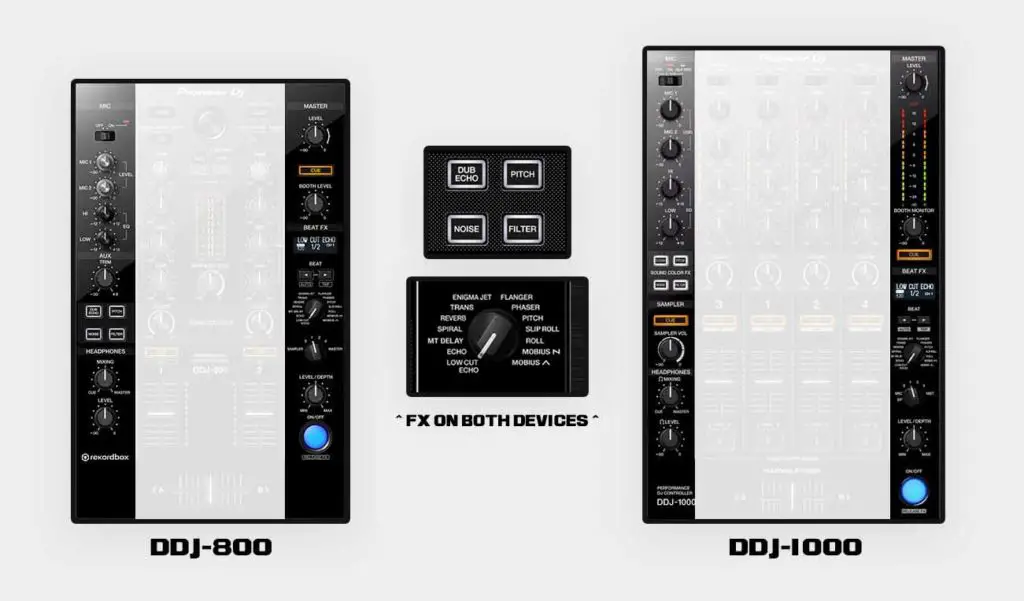
Both DDJ-800 and DDJ-1000 feature the very same full set of Beat FX and Sound Color FX with identical FX controls consisting of a Beat FX and Sound Color FX strips on both sides of the mixer.
A very important thing here is, that while the audio FX section on the Pioneer DDJ-1000 is powered by the hardware and can function in standalone mode, all the audio FX on the DDJ-800 are handled entirely by your DJ software. This means that you won’t have access to your effects if you’re using your DDJ-800’s mixer in standalone mode and you aren’t connected to your laptop.
Here are all the audio FX that are available on both the DDJ-800 and the DDJ-1000:
Beat FX:
- Flanger
- Phaser
- Pitch
- Slip Roll
- Roll
- Mobius Saw
- Mobius Triangle
- Enigma Jet
- Trans
- Reverb
- Spiral
- MT Delay
- Echo
- Low Cut Echo
Sound Color FX:
- D. Echo
- Pitch
- Noise
- Filter
The very last important thing about the audio FX here is that on the Pioneer DDJ-800 you have no way of using your FX on your microphone input. On the DDJ-1000 this easily achievable by turning the FX channel knob to the “MIC” position.
Performance pads
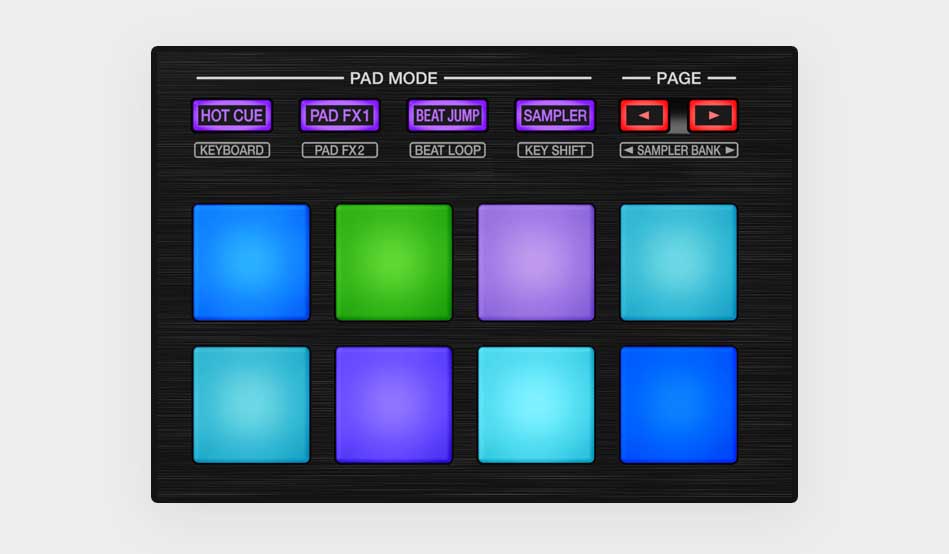
Pioneer DDJ-800 and DDJ-1000 feature the very same performance pad modes, and their performance pads are built exactly the same.
There’s really nothing more to say here. The functionality of the performance pads is identical on the Pioneer DDJ-800 and the Pioneer DDJ-1000.
Here are the performance pad modes available on both of these devices:
- Hot Cue – standard hot cue mode.
- Pad FX 1 – access to Rekordbox DJ Pad FX.
- Beat Jump – allows you to jump a fixed number of beats through your track.
- Sampler – a standard sampler.
- Keyboard – pitch play mode allowing you to pitch shift selected parts of the track.
- Pad FX 2 – the second bank of Rekordbox DJ Pad FX.
- Beat Loop – access to simple instant loop presets.
- Key Shift – track pitch shifting controls.
Software compatibility
Both the Pioneer DDJ-800 and the Pioneer DDJ-1000 are compatible with Rekordbox DJ software out of the box. To use them with Rekordbox, you don’t have to purchase any additional software licenses, as they act as hardware unlock devices for the Rekordbox DJ software.
What Is a Hardware Unlock Device? – DJ Controllers
Moreover, both these controllers are also officially supported by Virtual DJ, and with some effort can be used with custom Traktor Pro 3 mappings.
Neither the Pioneer DDJ-1000, nor the Pioneer DDJ-800 work with Serato DJ software.
Although the Pioneer DDJ-1000 doesn’t support Serato DJ software, it actually has an official Serato compatible counterpart – the Pioneer DDJ-1000SRT. Check it out here on Amazon if you’re interested!
Check out the comparison of the DDJ-1000 and DDJ-1000SRT here: Pioneer DDJ-1000 vs. DDJ-1000SRT (What Are The Differences?)
| Pioneer DDJ-1000SRT on Ebay: |
Pioneer DDJ-400 vs. DDJ-800
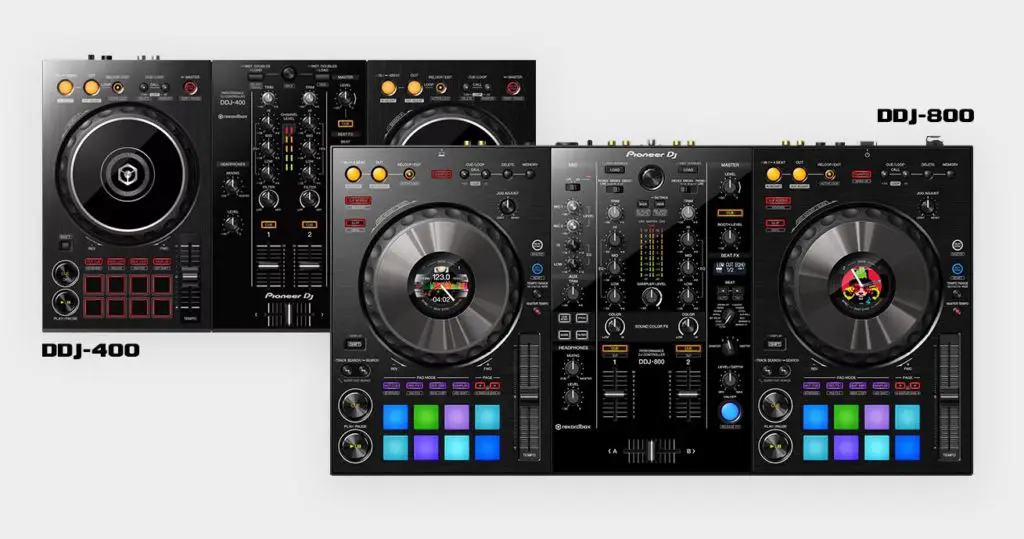
As we previously mentioned, the Pioneer DDJ-800 can be easily seen as a step up from entry-level DJ controllers such as the Pioneer DDJ-FLX6 or the Pioneer DDJ-400.
Pioneer DDJ-FLX6 vs. DDJ-1000 (Direct Comparison!)
The Pioneer DDJ-800 offers you much more features and therefore much more creative and technical freedom during your mixes.
The most notable differences here are the exceptional audio FX selection on the DDJ-800 compared to the very limited and cut-down Beat FX strip implementation on the DDJ-400, and the notable upgrade when it comes to size – the Pioneer DDJ-800 features a full-size crossfader, bigger jog wheels with built-in displays, full-size performance pads and less crammed control layout.
DDJ-Rev1 vs. DDJ-400 (Which Is Better For You?)
Overall, if you’re wondering whether to get yourself a brand new DDJ-400 or the DDJ-800 as your first DJ controller and you think about DJing seriously, we would strongly advise you to go straight for the Pioneer DDJ-800 – you won’t regret your decision!
Pros and cons
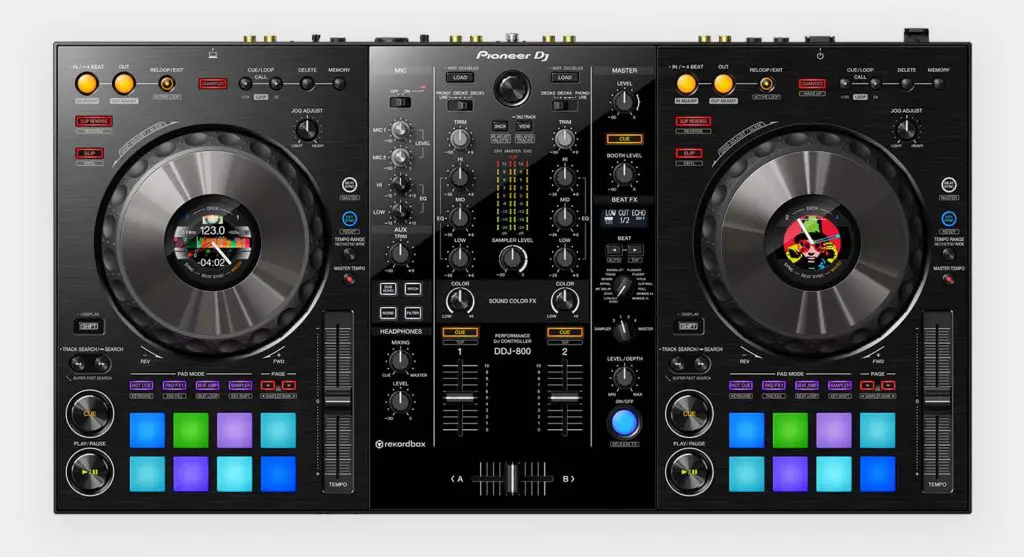
Pros:
- Full set of Beat FX & Sound Color FX.
- 2 quality capacitive jog wheels with tension adjust controls.
- More compact and easier to carry around than the DDJ-1000.
- Access to virtual decks 3 & 4 using the on-board deck switch buttons.
- An aux input with gain control compensating for the lack of 4 mixer channels with additional inputs.
- Great upgrade from virtually any entry-level DJ controller.
Cons:
- The audio FX are software-based and thus won’t work in standalone mode.
- No possibility to use the audio FX on the microphone input.
- Smaller, non-mechanical jog wheels.
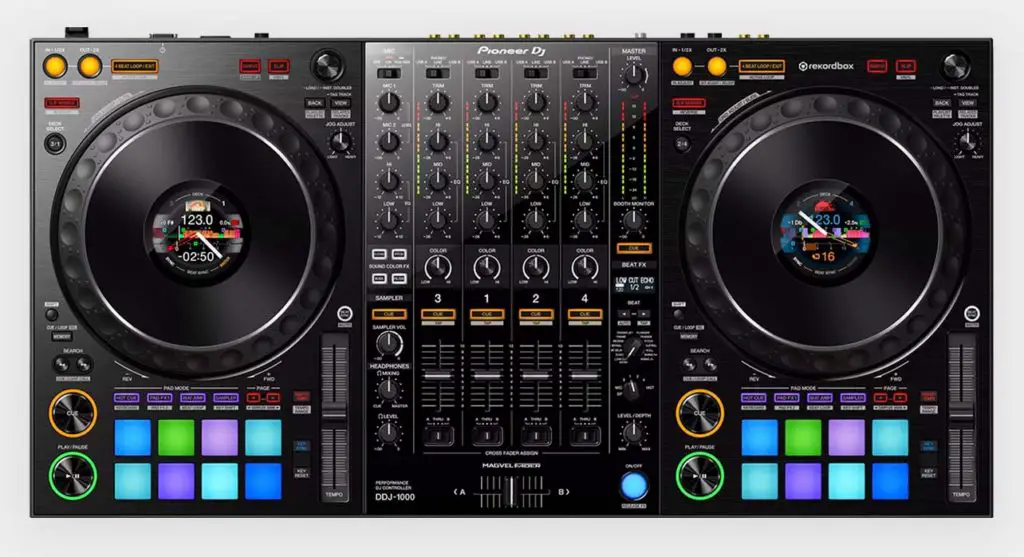
Pros:
- Full size mechanical jog wheels taken straight from the Pioneer CDJ-2000 player series (with tension adjust controls).
- Full set of Beat FX & Sound Color FX (which also works when the mixer is on in standalone mode).
- 4 mixer channels with appropriate audio inputs.
- Library controls and track selection knobs separate for each deck.
Cons:
- More bulky and heavier than the DDJ-800.
- Features a weirdly small shift button.
- Will always be muchmore expensive than the DDJ-800.
The price and availability
The general prices of both units may vary depending on different factors, however the rule of thumb is that the Pioneer DDJ-800 is always less expensive than the more advanced DDJ-1000.
You can check the prices of both these devices using our supplied links here:
| Controller | Features | Price |
|---|---|---|
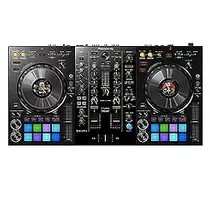 | Pioneer DDJ-800: – Capacitive jog wheels with adjustable tension. – Full set of software based DDJ-1000 audio FX. – A more compact solution. | Check price on Amazon Check price on Ebay |
| Pioneer DDJ-1000: – Full size mechanical jog wheels. – Hardware based audio FX. – 4-channel mixer with separate channel audio inputs. | Check price on Amazon Check price on Ebay |
The conclusion – which one is better for you?
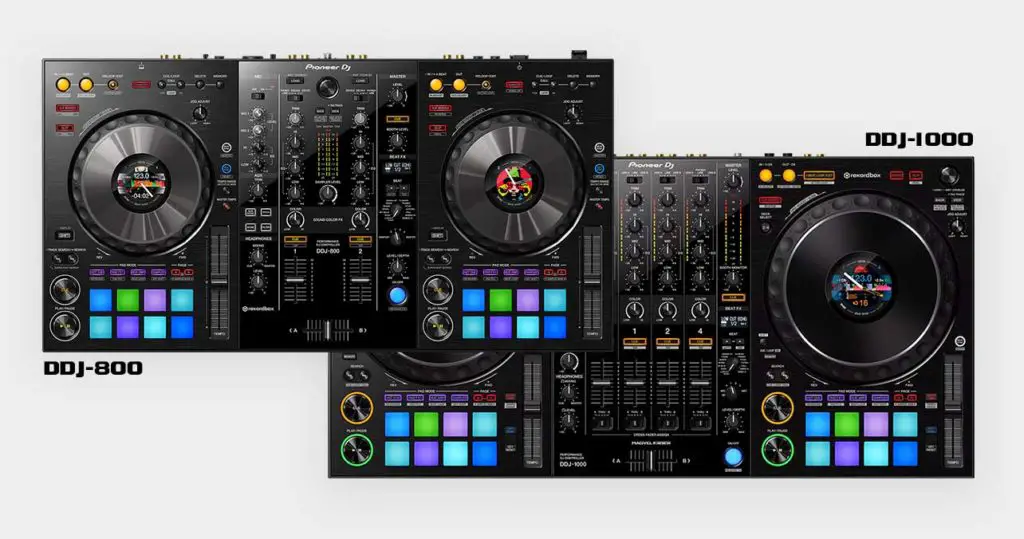
So, which one of these DJ controllers would be best for you? It really boils down to how powerful of a DJ controller you really need and whether or not you can afford the best overall solution that is the Pioneer DDJ-1000.
Both the DDJ-1000 and the DDJ-800 are great DJ controllers that are more than suitable for beginners and give you lots and lots of tools for preparing an unforgettable live performance.
As their feature sets are really similar, aside from their price, you might decide on one or the other based on their size and overall weight which are really important factors nonetheless.
The difference in size and weight between the Pioneer DDJ-1000 and the Pioneer DDJ-800 is quite notable. The DDJ-1000 weighs around 13 lb / 6 kg, while the DDJ-800 – around 10 lb / 4.5 kg. While this doesn’t seem like much, the DDJ-800 is much easier to move around when outside a controller case.
To sum it all up, you won’t be disappointed with any of these devices. The Pioneer DDJ-800 and DDJ-1000 are top notch professional DJ controllers that can be easily used both for casual home practice and for club gigs. We hope we helped you with your DJ controller choice. If you have any other questions, feel free to ask in the comments down below. Rock on!
| Pioneer DDJ-800 on Ebay: |
| Pioneer DDJ-1000 on Ebay: |

